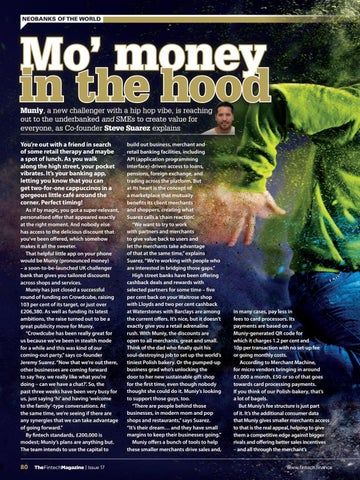NEOBANKS OF THE WORLD
Mo’ money in the hood Muniy, a new challenger with a hip hop vibe, is reaching out to the underbanked and SMEs to create value for everyone, as Co-founder Steve Suarez explains You’re out with a friend in search of some retail therapy and maybe a spot of lunch. As you walk along the high street, your pocket vibrates. It’s your banking app, letting you know that you can get two-for-one cappuccinos in a gorgeous little café around the corner. Perfect timing! As if by magic, you got a super-relevant, personalised offer that appeared exactly at the right moment. And nobody else has access to the delicious discount that you’ve been offered, which somehow makes it all the sweeter. That helpful little app on your phone would be Muniy (pronounced money) – a soon-to-be-launched UK challenger bank that gives you tailored discounts across shops and services. Muniy has just closed a successful round of funding on Crowdcube, raising 103 per cent of its target, or just over £206,380. As well as funding its latest ambitions, the raise turned out to be a great publicity move for Muniy. “Crowdcube has been really great for us because we’ve been in stealth mode for a while and this was kind of our coming-out party,” says co-founder Jeremy Suarez. “Now that we’re out there, other businesses are coming forward to say ‘hey, we really like what you’re doing – can we have a chat?’. So, the past three weeks have been very busy for us, just saying ‘hi’ and having ‘welcome to the family’-type conversations. At the same time, we’re seeing if there are any synergies that we can take advantage of going forward.” By fintech standards, £200,000 is modest; Muniy’s plans are anything but. The team intends to use the capital to
80
TheFintechMagazine | Issue 17
build out business, merchant and retail banking facilities, including API (application programming interface)-driven access to loans, pensions, foreign exchange, and trading across the platform. But at its heart is the concept of a marketplace that mutually benefits its client merchants and shoppers, creating what Suarez calls a ‘chain reaction’. “We want to try to work with partners and merchants to give value back to users and let the merchants take advantage of that at the same time,” explains Suarez. “We’re working with people who are interested in bridging those gaps.” High street banks have been offering cashback deals and rewards with selected partners for some time – five per cent back on your Waitrose shop with Lloyds and two per cent cashback at Waterstones with Barclays are among the current offers. It’s nice, but it doesn’t exactly give you a retail adrenaline rush. With Muniy, the discounts are open to all merchants, great and small. Think of the dad who finally quit his soul-destroying job to set up the world’s tiniest Polish bakery. Or the pumped-up business grad who’s unlocking the door to her new sustainable gift shop for the first time, even though nobody thought she could do it. Muniy’s looking to support those guys, too. “There are people behind those businesses, in modern mom and pop shops and restaurants,” says Suarez. “It’s their dream… and they have small margins to keep their businesses going.” Muniy offers a bunch of tools to help these smaller merchants drive sales and,
in many cases, pay less in fees to card processors. Its payments are based on a Muniy-generated QR code for which it charges 1.2 per cent and 10p per transaction with no set-up fee or going monthly costs. According to Merchant Machine, for micro vendors bringing in around £1,000 a month, £50 or so of that goes towards card processing payments. If you think of our Polish-bakery, that’s a lot of bagels. But Muniy’s fee structure is just part of it. It’s the additional consumer data that Muniy gives smaller merchants access to that is the real appeal, helping to give them a competitive edge against bigger rivals and offering better sales incentives – and all through the merchant’s www.fintech.finance
